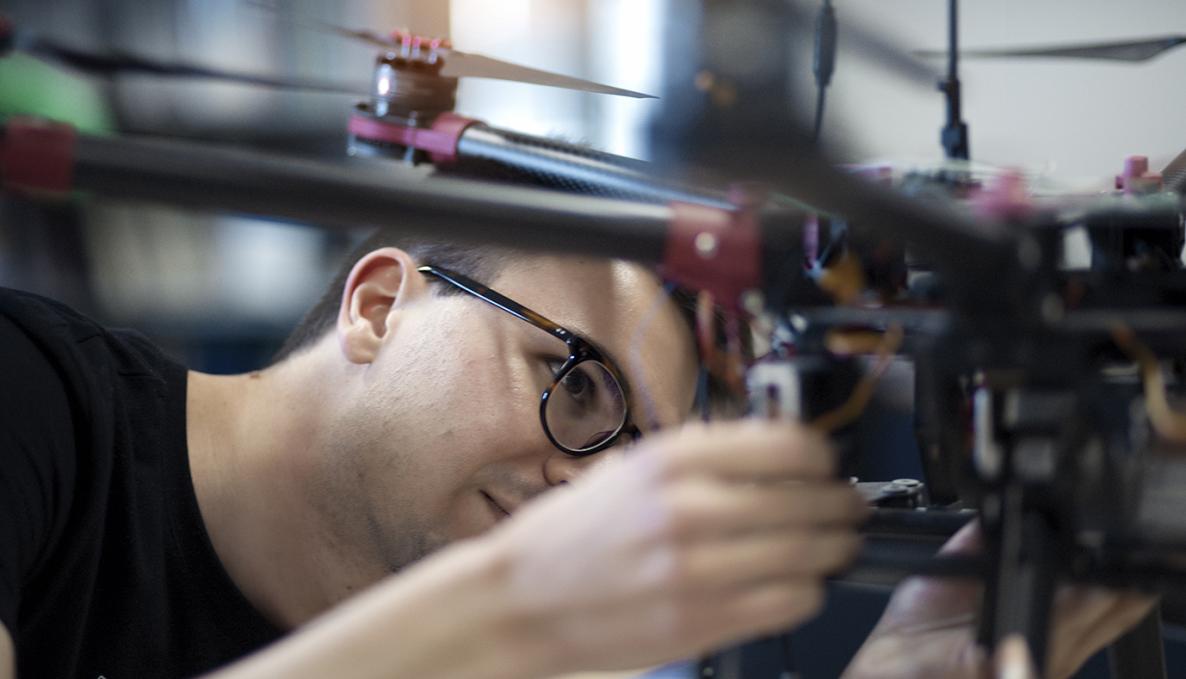Le attività del Dipe Robotics & AI

La ricerca del Dipartimento di Eccellenza in Robotics & AI convolge un numero considerevole di docenti e ricercatori (circa l’80% del personale afferente ai tre Istituti che vi partecipano) e ha prodotto nel corso del primo periodo di finanziamento (2018-2022) numerose linee di ricerca sulla Robotica e l’intelligenza artificiale nei settori di AI e Scienze dei materiali.
Di seguito elenchiamo la lista dei temi di ricerca ai quali afferiscono gruppi di ricercatori sia interni che di altre università, e che hanno partecipato al raggiungimento di risultati scientifici nel corso di questo periodo. Per ciascuno dei temi inoltre, è disponibile una descrizione in allegato (esclusivamente in lingua inglese) dei contenuti del tema di ricerca, del team iniziale di lavoro e dei recenti risultati scientifici pubblicati (circa 400):
Research on AI
- Safe and Secure AI
- Time-predictability in the execution of AI workload
- Efficient Acceleration of Deep Neural Networks
- 5G Support for AI offloading
- Photonic Neural-Networks
- Transient myolectric signal for the prosthetic control
- The myokinetic control interface
- Design and assessment of bio-inspired control algorithms for human robot collaboration
- Design of a Liquid Handling Robot (LHR) with embedded AI algorithms
- Improvement, development, and application of neural interfaces
- Application of robotics to restore physiological impairment
- Analysis of neural, muscular and kinematic data for clinical applications
- Machine Learning in Industrial Process
- Deep Learning in Industrial Applications
- AI for metallurgic science
- AI Data Analytics for industry
- Multi Agent Systems for industrial applications
- Robotics application for the Metallurgical sector
- Deploy AI & Big Data in process industry
- AI for industrial quality inspection
- Vision based flexible robotic manipulation for industry
- Robotics and AI augmented human assistance and surveillance for health and safety
- Driverless and autonomous mobile systems
- Smart mobile localization and tracking
- Industrial Maintenance and Maintenance on Condition
- Path planning algorithms for robotics disinfection
- AI for intuitive control of exoskeleton based on motion intention detection and muscle synergies extraction
- Ethorobotics as a novel translational neuroethological engineering approach to turn findings into outcomes within real-world healthcare contexts
- Animal-robot interaction paradigm to face engineering and environmental challenges through sustainable strategies
- Natural intelligence for bioinspired computing and eco-friendly ecosystem management methods
- Novel Human-centered control approaches in Industry 4.0 context: special focus on welding process
- AI and data science strategies for tactile sensing and augmenting haptic feedback with applications to bionic prostheses, healthcare technologies, collaborative robotics and industry 4.0
Research on Smart Materials
- Integration of FBG sensors in robotics
- Development of FBG sensors reading units
- Electrostatic bellow muscle actuators
- Dielectric elastomers transducers for actuation and energy harvesting
- Electro adhesive gripper based on thin film dielectrics
- Development of exoskeleton systems for teleoperation assistance
- Soft Exosuit and Elastic joints
- Integration of innovative sensors in mechanical systems
- Design of wearable haptic devices
- Testing different coatings to ensure stability and in vivo safety of NdFeB magnets implanted in muscles in a myokinetic control interface
- Mechanics and Geometry of Smart Materials for Shape Morphing and Sensing
- New class of biodegradable biohybrid agents with microorganism-based energy harvesting processes for environmental monitoring
- Investigating locomotion, ultra-structures, and biochemical features of living organisms for robotics and biomedical implementations
- Physical soft simulators and artificial organs
- Soft continuous arms and grippers
- Soft mechatronic technologies
- Shape programming for smart materials and deployable structures
- Design principles for bio-inspired microrobots: a two-way interaction between biology and engineering
- Implantable, wearable and portable mechano-electrotransducers
- Smart materials for endowing biomedical devices with enhanced properties
- Wearable Robotics: design, development, and validation of novel exoskeletons and lower-limb prostheses
